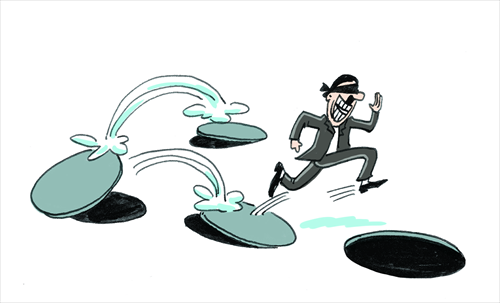HOME >> OP-ED
Berlin’s tough repentance lesson for Tokyo
Source:Global Times Published: 2015-6-9 22:13:01

Illustration: Liu Rui/GT
As two major Axis powers, Nazi Germany and Imperial Japan together inflicted grave disasters in the world during WWII. However, 70 years on, both countries have adopted utterly different paths to review the past. Through a profound introspection of their ancestors' atrocities, the Germans have moved forward after being forgiven by its victims and regaining dignity from the world, while Japan, haunted by the legacy of militarism and manipulated by geopolitics, is trying every means to understate or even deny its past war crimes.
Some Japanese politicians and scholars have argued that the Japanese government has made apologies to its war victims for dozens of times in both formal and informal settings. But according to a four-episode Chinese documentary called Truth and Denial - Germany and Japan's Postwar Redemption that became popular recently, most of these apologies are full of word play and tricks, and would even be denied days or weeks later by other Japanese politicians and experts.
That is why the Chinese and South Korean governments are indignant at Japan's evasion of core questions with the judgment of its wartime past, saying most of these apologies are "insincere" and calling for the Japanese government to "face up to its war crimes."
However, the headstrong Japanese government, under the influence of the right wing, meets these criticisms head-on and steps up its efforts to mislead public opinion on historical issues. Since 1994 when then justice minister Nagano Shigeto resigned over denying the Nanjing Massacre, controversial statements to whitewash Japan's wartime atrocities have been launched by top politicians, but few would be sacked for such remarks.
These statements and even brazen denials of Japan's war crimes reflect a distortion of Japanese society in face of the wartime past. On a cultural and historical dimension, from the Meiji Restoration in the 1860s to Japan's defeat in 1945, Japanese society, blinded by the need for expansion and exploitation, had developed an entirely misleading perception that it had a duty to save East Asia, because Japan gradually came to see itself as an heir of the Chinese culture, which prevails in East and Southeast Asia.
It believed that Chinese culture had declined in its area of origin, and Japan, benefiting from industrialization and regaining independence from foreign intrusions, assumed a superior mind-set against China, which it had been worshiping for centuries in ancient times.
On this mental basis, which has taken root in Japanese society, the geopolitical vicissitudes after the end of WWII have further distorted Japanese society's perception of war crimes.
Unlike Germany, where the entire Nazi machine was smashed by the Allies through giving fair sentences to almost all war criminals and uprooting Nazism, Japan slipped away from a thorough transformation, especially in its social mentality.
The sole US domination on Japanese soil after 1945 prevented Japan from a full-scale "purge" as should have been done, as in Germany after the war. Then Japanese Emperor Hirohito and the imperial system were preserved at Washington's behest, and even the Tokyo Trials didn't give sentences to Japanese war criminals as fairly and comprehensive as the Nuremberg Trials.
Chances for Japanese society to fully introspect over WWII dimmed when the iron curtain was veiled after 1947. Washington, acting in its own interests, soon shifted its policy and started to foster Japan as its sentinel in the Cold War, during which time the introspection was downplayed again.
Therefore, the deep-rooted cultural inclination and changing geopolitical climate are the major cause why Japan doesn't want to face up to its disgraceful history. From the 1960s to the 1980s, Japan focused on growth and soon became the second largest economy. Its national pride resurrected with its status in the international community rising high. There is little willingness left in Japan to conduct a deep introspection.
Japan's distorted historical understanding will not fade away in the foreseeable future as China's rise adds new impetus to Japan's concerns. Troubled by slumping economic growth and an aging population, Japanese society is confused about its future. Its territorial disputes with China and the distrust they have caused will intertwine with the historical issues, which will continue to drag Japan down further to misconceptions.
The earlier Japan realizes that historical issues can be discussed but not denied, the better it can re-orientate its path in the new age and the more potentials of development it can explore through close cooperation with neighbors. Germany's neighbors give its dignity back after it chose to engrave its responsibilities on its mind. Japan should remember that forgiveness only comes when the offender remembers the wrongdoings forever.
The article was compiled by Global Times reporter Liu Zhun based on an interview with Yang Bojiang, a research fellow at the Institute of Japanese Studies, Chinese Academy of Social Sciences. liuzhun@globaltimes.com.cn
Posted in: Viewpoint